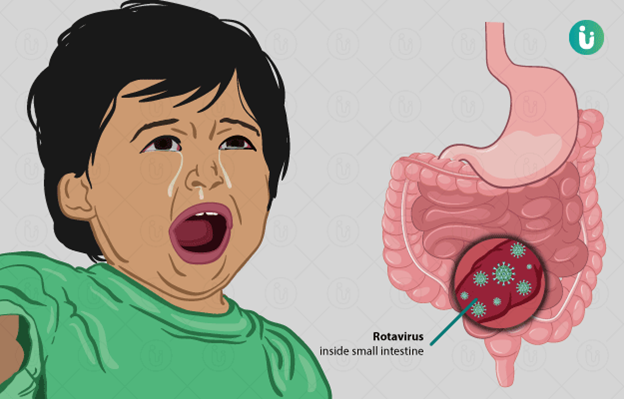The viral pathogen that frequently causes acute diarrhea in young children is:
Rotavirus.
Salmonella organisms.
Shigella organisms.
Giardia organisms.
The Correct Answer is A
The correct answer is choice A: Rotavirus.
Choice A rationale:
Rotavirus is a viral pathogen that frequently causes acute diarrhea in young children. It is highly contagious and is responsible for a significant portion of severe diarrhea cases worldwide. Rotavirus infections are most common in infants and young children, and they can lead to dehydration, especially in developing countries where access to clean water and proper sanitation might be limited.

Choice B rationale:
Salmonella organisms can cause food poisoning and gastrointestinal infections that lead to diarrhea. However, they are more commonly associated with bacterial infections rather than viral-induced acute diarrhea.
Choice C rationale:
Shigella organisms are also bacterial pathogens that cause diarrhea, specifically bacillary dysentery. While they can cause severe diarrhea, they are not the viral pathogen typically responsible for acute diarrhea in young children.
Choice D rationale:
Giardia organisms are parasites that can cause gastrointestinal infections leading to diarrhea. However, they are not viruses, and they are less commonly associated with acute diarrhea in children compared to rotavirus.
Nursing Test Bank
Naxlex Comprehensive Predictor Exams
Related Questions
Correct Answer is D
Explanation
The correct answer is Choice D: Refer children with sore throats for throat cultures.
Choice A rationale:
Recommending salicylates instead of acetaminophen for minor discomforts is not relevant to the prevention of rheumatic fever. Rheumatic fever is primarily associated with untreated streptococcal infections, particularly streptococcal pharyngitis (strep throat), which can lead to complications such as rheumatic fever if left untreated. The choice of pain relievers like salicylates or acetaminophen doesn't play a significant role in preventing rheumatic fever.
Choice B rationale:
Encouraging routine cholesterol screenings is not relevant to the prevention of rheumatic fever. Rheumatic fever is an immune-mediated inflammatory response to certain strains of Streptococcus bacteria, particularly Streptococcus pyogenes. Cholesterol screenings are more related to assessing cardiovascular risk and are not directly linked to preventing rheumatic fever.
Choice C rationale:
Conducting routine blood pressure screenings is not directly related to the prevention of rheumatic fever. Blood pressure screenings are important for identifying hypertension and other cardiovascular risk factors, but they do not have a direct impact on preventing rheumatic fever, which is primarily a complication of untreated streptococcal infections.
Choice D rationale:
Refer children with sore throats for throat cultures. This is the correct choice. Rheumatic fever often develops as a result of untreated streptococcal pharyngitis (strep throat). Throat cultures are crucial for diagnosing streptococcal infections and determining the appropriate course of treatment with antibiotics. By identifying and treating streptococcal infections promptly, the risk of developing rheumatic fever can be significantly reduced.
Correct Answer is A
Explanation
The correct answer is choice A: Signs of stress.
Choice A rationale:
Children often express stress through physical complaints such as stomach pains, headaches, and fatigue. The 9-year-old's complaints of stomach pains, along with the description of aggressive and stubborn behavior, are indicative of stress. Stressors can include academic pressures, family issues, social challenges, or other emotional factors.
Choice B rationale:
Developmental delay refers to a situation where a child's developmental milestones are significantly delayed compared to their peers. This doesn't align with the presented symptoms of stomach pains, aggression, and stubbornness. These symptoms are more indicative of emotional or psychological distress.
Choice C rationale:
While a physical problem could potentially cause emotional stress, the scenario doesn't provide enough information to directly conclude that a physical problem is the primary trigger. Stomach pains could indeed result from emotional stress, and it's important to consider the child's overall well-being.
Choice D rationale:
Lack of adjustment to the school environment can lead to behavioral and emotional challenges, but it's not the most direct explanation for the symptoms described in the scenario. The combination of stomach pains and behavioral changes suggests a more immediate emotional trigger, which is often stress-related.
Whether you are a student looking to ace your exams or a practicing nurse seeking to enhance your expertise , our nursing education contents will empower you with the confidence and competence to make a difference in the lives of patients and become a respected leader in the healthcare field.
Visit Naxlex, invest in your future and unlock endless possibilities with our unparalleled nursing education contents today
Report Wrong Answer on the Current Question
Do you disagree with the answer? If yes, what is your expected answer? Explain.
Kindly be descriptive with the issue you are facing.
